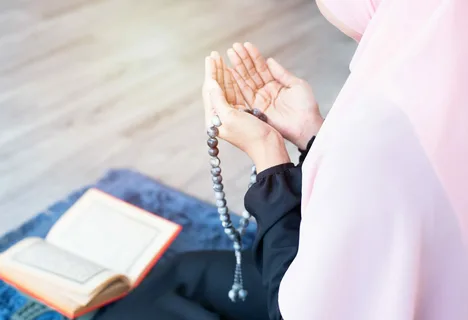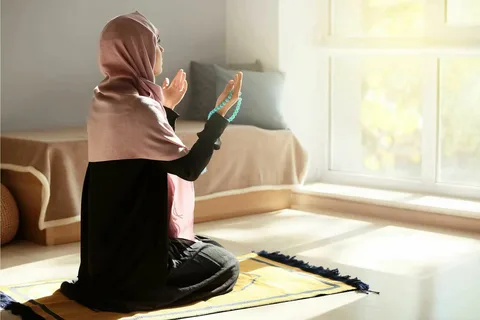During the holy month of Ramadan, Muslims around the world engage in extra prayers known as Taraweeh. These prayers hold significant importance in Islam and are traditionally performed in congregation at mosques. However, there is a growing question among Muslim women about whether they Can women pray taraweeh at home.
What is Taraweeh?

Taraweeh prayers are special prayers performed by Muslims during the month of Ramadan. They are offered at night after the Isha prayer and consist of multiple units of prayer, known as Rakats.
Importance in Islam
Taraweeh prayer holds significant importance in Islam for several reasons:
- Sunnah of the Prophet Muhammad (peace be upon him): Taraweeh is a practice established by the Prophet Muhammad during the month of Ramadan. He prayed Taraweeh in congregation with his companions on several occasions during Ramadan, setting an example for Muslims to follow.
- Extra Rewards in Ramadan: Performing acts of worship, such as Taraweeh, during Ramadan carries special significance and earns extra rewards from Allah. It is a time when the blessings and mercy of Allah are abundant, and engaging in extra prayers like Taraweeh is highly encouraged.
- Opportunity for Spiritual Reflection and Renewal: Taraweeh prayers provide Muslims with an opportunity to engage in extended acts of worship, including recitation of the Quran and prolonged supplication. This allows for spiritual reflection, self-improvement, and renewal of faith during the blessed month of Ramadan.
- Community Cohesion: Praying Taraweeh in congregation fosters a sense of community and unity among Muslims. It is a time when believers come together to worship, strengthen their bonds, and support one another in their spiritual journey.
- Completion of the Quran: Many Muslims aim to complete the recitation of the Quran during Taraweeh prayers throughout Ramadan. By dividing the Quran into manageable portions and reciting it over the course of the month, Muslims can fulfill the spiritual goal of completing the entire Quran, which is highly meritorious.
- Seeking Forgiveness and Mercy: Ramadan is a time for seeking forgiveness, mercy, and redemption from Allah. Engaging in extra prayers like Taraweeh provides an opportunity for Muslims to seek forgiveness for past sins, supplicate for blessings, and draw closer to Allah.
- Establishing Discipline and Devotion: Praying Taraweeh requires commitment, discipline, and devotion, as it involves extended nightly prayers. Through consistent attendance and participation in Taraweeh prayers, Muslims develop spiritual discipline and strengthen their relationship with Allah.
Can women pray taraweeh at home

Traditional Views
Traditionally, Taraweeh prayers are performed in congregation at mosques, led by an Imam. Women are generally encouraged to pray at home, and it is considered meritorious for them to do so. However, some scholars have differing opinions on whether women can pray Taraweeh at home alone or with family members.
Modern Interpretations
In modern times, there is a growing acceptance of women praying Taraweeh at home. Many scholars argue that as long as the proper conditions for prayer are met, women can perform Taraweeh prayers in the comfort of their homes. This allows them to participate fully in the spiritual activities of Ramadan while also fulfilling their household responsibilities.
Benefits of Women Praying Taraweeh at Home
Women praying Taraweeh at home can offer several benefits:
- Flexibility: Praying Taraweeh at home allows women to pray at their convenience, without being constrained by mosque schedules or transportation issues. This flexibility can be especially helpful for women with family responsibilities or those who may not have easy access to a mosque.
- Privacy and Comfort: Some women may feel more comfortable praying at home, where they have privacy and can focus solely on their worship without distractions. This can enhance their spiritual experience during Taraweeh prayers.
- Family Bonding: Praying Taraweeh at home can become a family activity, where women can pray alongside their spouses, children, and other family members. This can foster a sense of unity and strengthen family bonds through shared religious observance.
- Educational Opportunities: Praying Taraweeh at home provides an opportunity for women to take on leadership roles in leading prayers and reciting from the Quran. This can enhance their knowledge and proficiency in Islamic rituals and teachings.
- Customization: Women can customize their Taraweeh prayers at home according to their preferences, such as choosing specific surahs or recitations that hold personal significance to them. This allows for a more personalized worship experience.
- Increased Focus: Without the distractions that may come with praying in a crowded mosque, women may find it easier to concentrate and focus on their prayers while at home, leading to a deeper spiritual connection during Taraweeh.
- Empowerment: For some women, praying Taraweeh at home can be empowering, as it allows them to take control of their worship experience and strengthen their connection with Allah in a space where they feel empowered and respected.
How to Perform Taraweeh at Home
- Setting the Intention: Before starting Taraweeh prayers, it is important to make a sincere intention (niyyah) to perform the prayers for the sake of Allah.
- Recitation of Quran: During Taraweeh prayers, it is customary to recite portions of the Quran. Women can choose to recite from memory or follow along with a Quranic text.
- Number of Rakats: The number of Rakats in Taraweeh prayers can vary, but it is typically performed in sets of two Rakats. Women can perform as many sets as they are comfortable with, keeping in mind their individual capacity.
FAQs
Can women lead Taraweeh prayers at home?
Traditionally, Taraweeh prayers are led by an Imam, and it is preferred for men to lead congregational prayers. However, if there are no men available to lead, women can lead the prayers at home for themselves and other women in the household.
Is it necessary for women to perform Taraweeh in congregation at a mosque?
While it is encouraged for men to perform Taraweeh prayers in congregation at a mosque, it is not obligatory for women. Women have the option to pray Taraweeh either at home or in congregation, depending on their circumstances and personal preferences.
How many Rakats are there in Taraweeh prayers?
The number of Rakats in Taraweeh prayers can vary, but it is traditionally performed in sets of two Rakats. Some mosques may offer 8, 12, or even 20 Rakats during Taraweeh prayers, but the minimum recommended number is 8 Rakats.
Can women pray Taraweeh if they are menstruating?
According to Islamic teachings, women who are menstruating are exempt from performing ritual prayers, including Taraweeh. They can make up for the missed prayers once they are in a state of purity.
What are some recommended times for women to perform Taraweeh prayers at home?
Women can perform Taraweeh prayers at any time during the night, preferably after the Isha prayer. It is recommended to perform Taraweeh before the Witr prayer, which is the final prayer of the night. However, they can also divide the prayers into smaller sets and perform them throughout the night as it suits their schedule.
Conclusion
In conclusion, women have the option to pray Taraweeh at home, provided they fulfill the necessary conditions for prayer. This allows them to partake in the spiritual benefits of Ramadan while accommodating their personal responsibilities. Whether performed at home or in congregation, Taraweeh prayers serve as a means for Muslims to draw closer to Allah and seek His blessings during the blessed month of Ramadan.


